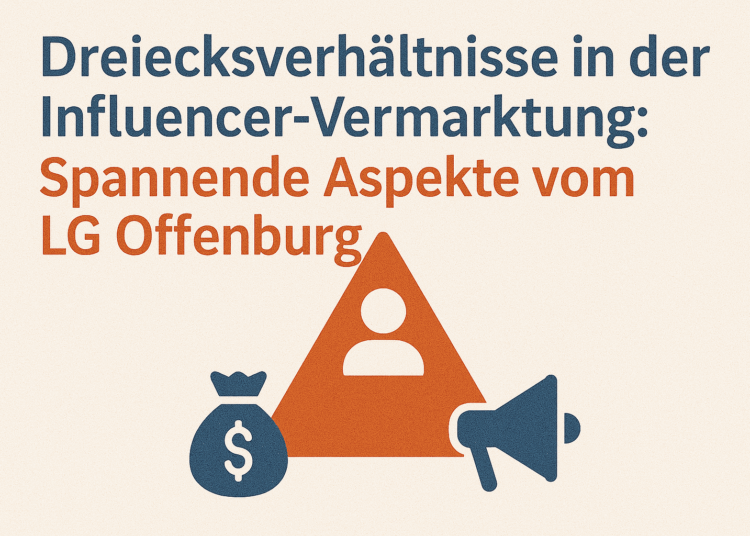In my legal practice in the areas of copyright law, competition law and IT law, I regularly advise management of influencers and intermediaries in complex contractual constellations. A recurring problem is the non-fulfillment of payment obligations by advertising partners, especially in intermediary relationships between influencers and brands. These constellations require a deep understanding of the legal dynamics and precise contract drafting in order to protect the interests of the intermediaries. In one such case, I recently obtained a significant judgment for an intermediary at the Regional Court of Offenburg, which provides important legal insights into the enforcement of payment claims in these constellations. This ruling not only highlights the legal challenges in influencer marketing, but also sets a precedent for similar cases. It underlines the importance of clearly defined contractual relationships and provides valuable guidance for the drafting of future contracts.
Separate contractual relationships as legal protection
The ruling by the Regional Court of Offenburg is a significant milestone in the legal handling of agency agreements in influencer marketing. It confirms the legality and enforceability of separate commission contracts between intermediaries and advertising partners. This practice, which is not in conflict with brokerage law pursuant to § 652 BGB, shows that the creation of an independent contractual relationship between the management and the advertising partner is an effective strategy for securing commission claims.
The court clarified that the remuneration of the management cannot be dependent on the performance of the influencer. It was established that, according to the express content of the contract, the mediating party was to be obliged to provide mediation and consulting services for the benefit of the defendant party, without the proper provision of services by the influencer being part of its responsibilities and obligations. This underlines the need for a clear separation of contractual relationships.
In addition, the issue of management duplication was addressed. The court pointed out that such activity is not generally prohibited, but only if it is “contrary to the contract”. It was explained that dual action is permissible even without express permission if the dual mandate was clearly recognizable or foreseeable for the other client side and the mediating party restricts itself to mediating between their interests. This shows that transparent communication and clear contractual terms are essential in order to avoid legal conflicts.
Finally, the issue of termination of the contractual relationship was also addressed. The court found that a right of termination had not been agreed and that the applicability of § 671 BGB was not given in this case. It was emphasized that the contractual relationship was not a gratuitous assignment, as the parties had agreed on remuneration for the work of the mediating party. This emphasizes the importance of careful contract drafting in order to clearly define the rights and obligations of both parties.
Independence of commission from influencer performance
A key aspect of the Offenburg Regional Court’s ruling is the finding that management remuneration cannot be dependent on the influencer’s performance. This finding is particularly exciting as it highlights the complexity and dynamics of triangular relationships in influencer marketing. In such constellations, where both the influencer and the brand determine the conditions and execution of their collaboration, two independent contractual relationships arise.
The court emphasizes that the intermediary has no direct influence on the performance of the influencer. This follows the logic that in a triangular relationship, where separate contracts exist between the intermediary and the advertising partner and between the influencer and the advertising partner, the performance of the intermediary is to be considered independently of that of the influencer. This independence is crucial as it forms the basis for the agent’s commission claims, regardless of how the influencer fulfills their contractual obligations to the brand.
The ruling reflects the need for clear and independent agreements between intermediaries, influencers and brands when drafting contracts. This independence protects the broker’s interests and ensures that his remuneration is not affected by factors beyond his control. It emphasizes the importance of careful and specific contract drafting in influencer marketing in order to clearly define the rights and obligations of all parties involved and avoid potential legal conflicts.
Conclusion and recommendation for action
The ruling by the Regional Court of Offenburg opens up significant perspectives for the drafting of contracts in influencer marketing. It deals comprehensively with the legal aspects that are decisive for the drafting of contracts in this area, in particular the importance of separate contractual relationships to secure commission claims and the clarification of the legal admissibility of dual activities in the context of brokerage law.
As a lawyer who specializes in this area, I see this ruling as a valuable basis for advising my clients. It offers detailed insights into the legal structures that are relevant for drafting contracts in influencer marketing and addresses specific challenges of triangular relationships.
For intermediaries of cooperations between influencers and brands, the ruling provides important points of reference for the design of their contracts. It enables me to offer targeted and well-founded advice and to develop contract structures that take appropriate account of the interests of both the intermediaries and the other parties involved. This particularly emphasizes the importance of thorough legal analysis and careful contract drafting.
I invite intermediaries and all players in the field of influencer marketing to contact me for individual advice and support in drafting their contracts. With the knowledge gained from this ruling, we can jointly ensure that your contracts comply with current legal requirements and are optimally tailored to your specific needs.












































